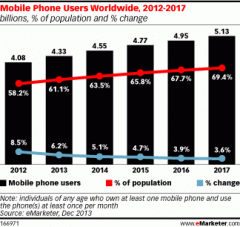It’s guest post day here at Duct Tape Marketing and today’s guest post is from Justin Emig – Enjoy!
 Just a few short years ago, smartphones were reserved for those bleeding edge consumers willing to spend half of their paycheck on a device double the size of their existing ‘feature’ phone that allowed you to replicate an experience historically reserved for desktops or laptops. The adoption quickly exploded and in 2012, global smartphone adoption reached 1 billion users. Emarketer predicts that in 2014, that number will balloon to 4.55 billion. 1 in 4 worldwide mobile phone users will have a smartphone this year, and each of them are using this device to find products and services, many of them locally.
Just a few short years ago, smartphones were reserved for those bleeding edge consumers willing to spend half of their paycheck on a device double the size of their existing ‘feature’ phone that allowed you to replicate an experience historically reserved for desktops or laptops. The adoption quickly exploded and in 2012, global smartphone adoption reached 1 billion users. Emarketer predicts that in 2014, that number will balloon to 4.55 billion. 1 in 4 worldwide mobile phone users will have a smartphone this year, and each of them are using this device to find products and services, many of them locally.
Search on Mobile Devices
Armed with connectivity, consumers quickly realized that they could find the information they needed with just a few clicks and keystrokes. Since Google is obviously in the search business, they tried to make mobile search easier through their cross device native apps and streamlined browser experiences.
In just a few short years, mobile search is quickly on its way to becoming the primary search vehicle; dethroning the once almost untouchable desktop search experience. Even Google’s famed SPAM fighter, Matt Cutts, commented he wouldn’t be surprised if mobile search surpassed desktop this year! With such volatile adoption, marketers and small business owners need to be aware of what this paradigm shift will mean for their business.
The Future of Mobile Search
One of the biggest challenges with mobile search is the fact many consumers start a search on mobile and finish on another device. Tracking consumers throughout the shopping experience will provide a stronger idea of what drove the purchase and how to market to them more effectively. The other big challenge is the scarcity of consumer attention. With mobile search consumers extremely unlikely to venture past the first search results page, showcasing the correct information, as fast as possible, is paramount for winning the mobile search click.
Smartphone manufacturers, Google, Microsoft and Facebook are scrambling to find out ways to predict what you will search for, before you search for it. This data will help streamline the process, speed up your mobile search experience and ultimately win the lion share of your attention. Amazon has already figured out a way to predict what you are going to purchase before you purchase it, so it is just a matter of time before this weaves its way into search.
Many people continue to scratch their head about Amazon releasing the Fire smartphone, with such dominant forces like Samsung and Apple occupying a stranglehold over the industry. While it appears to be ‘just another phone,’ Amazon introduces some features that could potentially change the mobile search experience forever.
Firefly Technology
 With Firefly, your phone is able to view printed text, recognize things around you, and most of all, listen to what is happening around you. Imagine having a conversation about making French Toast and being unable to remember what spice to use, and in a matter of seconds, a French Toast recipe appears on your phone, without any direct user interaction.
With Firefly, your phone is able to view printed text, recognize things around you, and most of all, listen to what is happening around you. Imagine having a conversation about making French Toast and being unable to remember what spice to use, and in a matter of seconds, a French Toast recipe appears on your phone, without any direct user interaction.
The Future of Mobile Search Marketing
There is no doubt that mobile search will surpass desktop search this year and be the primary vertical marketers and small business owners must focus their time. The major question is what will mobile search look like.
Google Now has the fundamentals necessary to be that predictive search engine. They have our cross device personalized history, manually curated search cards, and real time information. Add in a component of ‘selective’ listening to what is happening around us, and predictive search could be born. Apple is already ramping up their Siri efforts to compete with Google Now and so is Microsoft, with Cortana.
As if online marketing wasn’t hard enough for business owners and marketers to reach their target audience, the instantaneous needs of mobile search add yet another avenue they need to focus their efforts. However, moving quickly and optimizing your site for the mobile consumer could mean the difference between winning the mobile search battle and being relinquished to the catacombs of page 2.
 Justin Emig is the Search Marketing Manager for Web Talent Marketing, the #1 Digital Marketing Agency in the United States, according to TopSEOs.com. Here, Justin uses SEO, Paid Search, Content Marketing, and Social Media to increase conversions and leads. Justin has spent his career building brands of all sizes and effectively mixes the traditional advertising world with online marketing to effectively tell a brand’s story. You can connect with Justin on Google+, LinkedIn, Twitter, or see more of his content on the Web Talent Blog.
Justin Emig is the Search Marketing Manager for Web Talent Marketing, the #1 Digital Marketing Agency in the United States, according to TopSEOs.com. Here, Justin uses SEO, Paid Search, Content Marketing, and Social Media to increase conversions and leads. Justin has spent his career building brands of all sizes and effectively mixes the traditional advertising world with online marketing to effectively tell a brand’s story. You can connect with Justin on Google+, LinkedIn, Twitter, or see more of his content on the Web Talent Blog.

